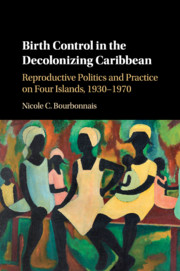 Birth Control in the Decolonizing Caribbean
Birth Control in the Decolonizing Caribbean Book contents
- Frontmatter
- Dedication
- Contents
- List of Figures, Maps, and Tables
- Acknowledgments
- List of Acronyms
- Introduction
- 1 The Answer, an Aid, a Right: Birth Control Debates and Social Movements in the Caribbean
- 2 From Politics to Practice: The Colonial Office, Foreign Activists, and Local Family Planning Clinics
- 3 Beyond Culture or Choice: Working-Class Families and Birth Control Clinics
- 4 A Matter of Cost: Reproductive Politics, State Family Planning Programs, and Foreign Aid in the Transition to Independent Rule
- Conclusion
- Bibliography
- Index
4 - A Matter of Cost: Reproductive Politics, State Family Planning Programs, and Foreign Aid in the Transition to Independent Rule
Published online by Cambridge University Press: 06 January 2017
- Frontmatter
- Dedication
- Contents
- List of Figures, Maps, and Tables
- Acknowledgments
- List of Acronyms
- Introduction
- 1 The Answer, an Aid, a Right: Birth Control Debates and Social Movements in the Caribbean
- 2 From Politics to Practice: The Colonial Office, Foreign Activists, and Local Family Planning Clinics
- 3 Beyond Culture or Choice: Working-Class Families and Birth Control Clinics
- 4 A Matter of Cost: Reproductive Politics, State Family Planning Programs, and Foreign Aid in the Transition to Independent Rule
- Conclusion
- Bibliography
- Index
Summary
On July 5, 1955, the elected members of Barbados’ House of Representatives voted “in the affirmative without division” to provide a grant of $5,000 to the Barbados Family Planning Association (BFPA). The grant came on the recommendation of a Joint Committee appointed in 1952 “to Examine the Question of Over-Population in Barbados,” which called on the government to take action to reduce the rapid rate of population growth. Although providing grants for nonprofit organizations was standard practice (on the same day the government renewed its $2,000 annual grant to the Salvation Army) and $5,000 hardly made a dent in the island's budget, the decision was considered monumental, for it placed Barbados in the company of only a handful of other governments around the world openly committed to spreading family planning services.
Barbados’ premier at the time, Sir Grantley Adams, had spoken out in favor of birth control as far back as 1938 and quickly embraced the island's new role as a world leader in family planning. In 1957, Adams spoke at the annual luncheon of the Planned Parenthood Federation of America (PPFA) in New York, calling on the pope and the United Nations to amend their policies to support birth control in underdeveloped countries. Adams's trip was praised by the PPFA, as well as by African American news organizations like the Cleveland Call and Post, which commended the steps taken by this “distinguished Negro leader.” It also attracted the attention of American Hugh Moore, founder of the Dixie Cup Corporation and author of The Population Bomb, a widely distributed pamphlet that warned in apocalyptic terms about population growth in the developing world. In April 1958, Adams was presented with the Hugh Moore Award for his “fearless advocacy of family planning to arrest the current population explosion which is retarding economic progress in underdeveloped countries.” The newly independent islands of Jamaica and Trinidad would also join Barbados in this “fearless advocacy,” announcing their support and committing state funding to family planning in 1964 and 1967, respectively. By 1974, nearly every island in the English-speaking Caribbean had followed suit, leading to a rapid expansion of birth control clinics armed with new methods like the pill and IUD.
- Type
- Chapter
- Information
- Birth Control in the Decolonizing CaribbeanReproductive Politics and Practice on Four Islands, 1930–1970, pp. 173 - 216Publisher: Cambridge University PressPrint publication year: 2016


